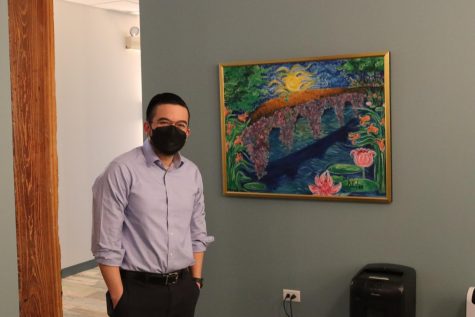Columbia’s Counseling Services expands to serve more students, with plans to hire new director this spring
March 16, 2023

In March 2021, Columbia’s Counseling Services had just two therapists and no director.
There were two graduate student interns helping, but college officials acknowledged the center was understaffed. It also was operating remotely, referring student clients to online mental health resources.
Now, two years later, Counseling Services is serving students in person again and has six therapists, more than it had before the start of the pandemic. Staff therapist Lillian Gecker was hired this month.
Last year, the staff provided services to 331 students, said Anna Looker, a licensed clinical professional counselor. With the expansion of the office, it served 301 students just last semester.
The center had a director until just recently when Emily Battle left. Coordinator Richard Chin is currently filling the role, and screening and interviewing for a replacement director will start this month, said Dean of Students Douglas Eck.
With three clinical interns who offer all services and are supervised by Columbia’s licensed therapists, the counseling staff will number 10 people once the new director arrives.
Half of all college students cite mental health issues as their biggest source of stress, according a nationwide survey of more than 1,200 college students by TimelyMD.
Mental health issues are still a significant concern but student stressors are pivoting away from the pandemic to other issues, according to the study.
Specific issues that are most concerning include personal finances (39%), academics (37%) and mass shootings and inflation each cited by 35% of student respondents. Marginalized groups have higher rates of depression and anxiety.
Even so, 53% students can be reluctant about getting professional mental health, the survey found.
Therapeutic services on campuses typically relate to behaviors that emerge from college stressors like being homesick, feeling depressed or experiencing social anxiety.
Counseling Services employs licensed professional LCPC and LCPW therapists.
“The majority of our student population benefits from that level of service, where maybe there is a small pocket of students that need a higher level of care that we are not structured for and set up to provide,” Eck said.
Columbia’s Counseling Services staff does not have psychologists who dispense medication. Should a student’s mental health needs fall outside of the scope of traditional therapy, staff work to link them with the proper resource, Eck said.
Counseling Services at the college are funded through tuition and fees and is not billed to a student’s health insurance. The insurance information the college has on its website is to help inform students who are seeking services through community providers and not through Columbia.
Eck said understanding the ins and outs of health insurance coverage is critical for parents and students to know before the start of any semester.
“Summer is a great time to look at your insurance and what coverage looks like because we know that insurance does not necessarily travel across state lines,” he said.
Columbia’s Counseling Services will work with students who have out-of-state or no insurance to identify applicable resources here in the city, he said.
Other resources include group therapy sessions that provide additional opportunities to get help.
“Sometimes the group therapy option might get overlooked,” Looker said.
This semester the college is offering three different therapy groups around college life, body image and relationships. Students can sign up for these groups online.
“I would like students to know that they shouldn’t hesitate to reach out to us. Whether you need one session or 10, we are here for you, and you are our priority,” she said. “We truly care about our students.”
Jasper Charles, a first-year creative writing major, has used the counseling service once.
“It was not a bad experience, and I think it’s helpful if you don’t have resources otherwise,” Charles said.
Students can find more information about Columbia’s Counseling Services on their website.
This article has been updated with clarifying language.







